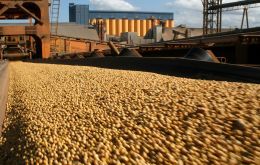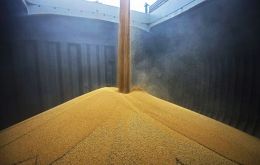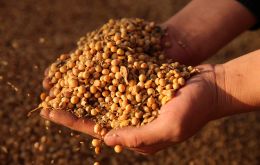MercoPress. South Atlantic News Agency
Tag: Soybeans
-
Monday, January 13th 2020 - 09:37 UTC
Argentine farmers increased forward selling of soybeans to avoid higher export taxes

Argentina farmers increased the forward selling of soybeans in the last four months of 2019 in an effort to avoid higher export taxes that are now in effect, according to a Global Agricultural Information Network report from the U.S. Department of Agriculture.
-
Thursday, January 9th 2020 - 09:49 UTC
Brazil after other markets if US and China agree on farm deal, mainly soybeans

Brazil could lose some recent gains it made in the global soy market during the US-China trade war if those two countries reach a deal to end their dispute, a Brazilian Agriculture Ministry official said on Wednesday.
-
Wednesday, April 24th 2019 - 11:36 UTC
Argentina trying to sell its soy bumper crop to China

Argentina is pushing to increase agricultural trade with commodities-hungry China, as farmers on the country’s Pampas grains belt prepare for what is expected to be a bumper soybean harvest over the weeks ahead.
-
Friday, April 12th 2019 - 21:33 UTC
Instead of agrochemicals, Uruguay uses wasps to develop non-genetically modified soy

In Uruguay, non-genetically modified soy (GMO) soy is being developed in order to compete in a market saturated by the volume of crops in the region. Nevertheless, the country’s government hopes Uruguayan soy will stand out for its quality rather than for the volume of harvests motivating soy producers to use “biological controls” to combat pests.
-
Thursday, April 11th 2019 - 09:27 UTC
Bumper harvest of soybeans and corn expected in Argentina, says Rosario grains exchange

Argentina's soy production will likely reach 56 million tons for the 2018/2019 season, two million tons more than previously estimated, the Rosario grains exchange said on Wednesday, a fillip for the sector that was battered by drought last year.
-
Wednesday, September 26th 2018 - 09:08 UTC
Brazil expected to import a million tons of soybeans from the US

Brazil, the world's No 1 soy exporter, is expected to import around one million tons of the oilseed in coming months from its largest global competitor, the United States, as local supplies dwindle, according to Sao Paulo-based grain trader Agribrasil.
-
Wednesday, July 11th 2018 - 08:47 UTC
China confident it can replace US soybeans with supplies from South America

China can increase soybean imports from other countries to reduce reliance on buying from the United States, the president of state grains trader COFCO said in an interview with the Communist Party’s official People’s Daily paper on Wednesday.
